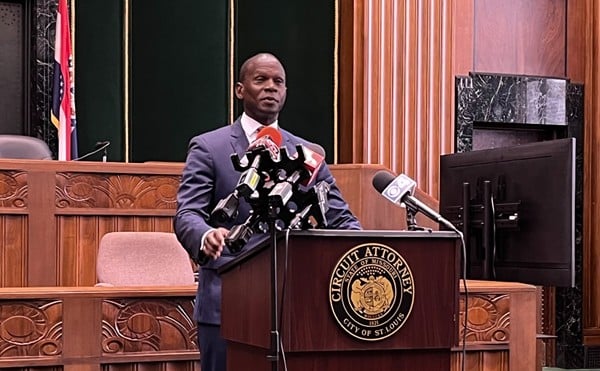Across the thousands of pages of court documents filed since SecureAxis Software's meltdown, only once does a company founder refer to the other as a "friend." The term "fucking Jew cocksucker," however, appears four times.
To outsiders, SecureAxis was just a small St. Louis start-up in the network-security field. But in the hearts of founders Jim Kalishman and Chris Elbring, who launched the outfit in 2005, it felt like a mountain of cash, ideas and dreams.
When that mountain began to crumble in late 2008, it loosed an avalanche of ferocious court filings that came to employ fourteen lawyers in three separate lawsuits and one criminal prosecution.
The big ideas at SecureAxis came from software "architect" Chris Elbring of Kirkwood — a tall, lean 41-year-old with a cool demeanor and a fondness for target shooting. The big money came from Ladue resident Jim Kalishman, 43, scion of a rich and prominent Jewish family. With a top-tier education and plump investment trust, he held himself out as a savvy investor.
Together, they set out in 2005 to make software that prevented information theft. Ironically, within four years, they would be accusing each other of stealing. And now, in St. Louis County Circuit Court, they're locked in a vicious battle with no truce in sight.
To his legal adversaries, Elbring is an anti-Semite who used ties to Russian programmers to embezzle thousands of dollars. Kalishman, meanwhile, is portrayed in court documents as an insecure know-it-all who used his great wealth and influence to destroy a former business partner rather than admit failure.
Even attorneys embroiled in the conflict marvel at it. Says First Assistant United States Attorney Michael Reap, who led the criminal prosecution: "The purpose of lawyers on the planet is to solve problems. I don't know that anything we did solved the problem. I think we might have only made matters worse.
"In my opinion, this thing has grown exponentially from a smaller lawsuit to a monster situation that is out of control."
The late Jerome "Jerry" Kalishman was a tough act to follow.
Already a respected attorney, he cofounded a company in 1982 that licensed a method for fixing pipes without digging. By the mid-'90s, it had grown into the publicly traded Insituform Technologies Inc. — earning Kalishman a fortune. He became president of the elite Westwood Country Club and showered donations on Washington University, Jewish groups and various charities.
Soon after Jerry's death in 1998, his sons Tom and Jim launched a venture of their own. They called it Maverix. The idea was to provide high-speed Internet to Midwestern businesses. With $42.5 million in raised capital ($2 million from the brothers themselves), they leased a swanky office in downtown Chicago and boasted of plans to serve 30 cities in short order.
But Maverix flopped. Badly. The brothers filed for bankruptcy on its behalf in January 2001, leaving creditors short several million dollars. Disgruntled former employees kvetched publicly about the difficulty of getting final checks from the wealthy Kalishmans, as the St. Louis Business Journal reported. Even a former executive defending their character conceded their "naiveté, pride and lack of management experience."
Yet Jim Kalishman still had a lot going for him. Not only did he have an MBA from the Kellogg School of Management, the highly ranked business school at Northwestern University, he also had accesss to an investment trust set up by his parents. (Through his lawyer, Kalishman declined repeated requests for an interview with Riverfront Times.)
Sniffing around for a new opportunity in 2004, Jim Kalishman was introduced to Chris Elbring.
"He was nice enough," recalls Elbring. Both men were in their mid-thirties at the time. "He seemed like he'd been a rich kid, one of these guys who claimed to know a lot of stuff and have tons of connections."
Elbring's own background was unusual: He'd lived in Russia for five years, doing marketing for a firm that quarried white marble. There, he'd grown intrigued by information technology. Now he was back, and he had ideas.
For example, Elbring pitched to his "angel investor": Wouldn't it be great to offer companies software that could thwart someone — say, a fired employee on her last day — from using a USB flash drive to download trade secrets or customer info?
Kalishman bounced the idea off some industry insiders. Within a few months, he was sold. He agreed to start a company with Elbring and invest an initial $500,000 through his trust — in installments, to ensure certain benchmarks were reached.
In early 2005, lawyers drew up the contracts. SecureAxis was born.
Over the next four years, the partners added staff and riffed on their original idea. They came up with "VeriPlay," software that would enable movie rentals on flash drives. The film would only be accessible for a limited time, and pirating would be impossible. But soon they changed course toward "OutProtect," which was designed to protect company data that's stored and processed online — a practice known as "cloud computing."
Success was mixed. The software worked well in tests, but early customers reported glitches. The partners quarreled over what to do next.
So in April 2008, they recruited a new CEO: Ted Briscoe, a former executive at AskJeeves .com and "a big deal in software," as Elbring described him at the time. Briscoe's task was to drum up funding and prepare for a commercial launch that autumn.
The software industry badly needed products such as OutProtect, Briscoe recalls. Kalishman and Elbring, he says, saw that need early.
"It was a great idea."
By 2008, however, resentments that had smoldered for two years began to crackle. Elbring oversold the software's progress, Kalishman would claim in court filings, and was "hostile, abusive and demeaning."
Meanwhile, Elbring counters that Kalishman was "disruptive" in the office, a Blackberry slave who frequently broke up business conversations by taking personal calls. Worse, he was "literally obsessive compulsive" about expenditures, Elbring says, devoting hours to save a pittance on patch cables or desk chairs.
At one point, Elbring recalls, his partner shared an article about a psychological disorder he claimed to suffer from, a condition in which spending money causes actual, physical pain. (In a later affidavit, Kalishman denied that.)
Of course, the money was Kalishman's to spend. But Elbring says his partner's cheapness broke the company's stride: "We were trying to do something that had never been done before, and it was cool, but we needed to spend money to do it. We needed servers, real servers. Jim wanted to buy used servers. You just couldn't get anything done."
Kalishman did shell out for certain items, though. Such as condoms.
In the fall of 2008, Kalishman dropped hundreds of dollars on "OutProtect" condoms for a major trade show.
"He thought it was an attention-grabber," Elbring says. "There he was, handing out condoms as the company is falling apart."
By late 2008, the financier appeared to be losing faith. The big launch slated for the third quarter had to be delayed. The software still needed work. Loans that the start-up had received from family and friends the previous year were coming due, but Kalishman refused to renegotiate them.
Elbring grew distraught, fearing his vision and work would be wasted.
"This was my baby," Elbring says. "I really believed in it, to the point where I had a trust set up, and I put some of my shares in the trust for my kids."
Briscoe offered a solution. He would quit as the company's CEO, even while remaining on the three-man board of directors as a tie-breaker. Operations would shrink to just Elbring and two programmers — funneling all the remaining cash solely toward development.
Kalishman and Elbring agreed, and Elbring took the reins from Briscoe as the new CEO.
His first move was to get rid of several people from the office — including his partner and chief investor, Jim Kalishman.
"I would like to start fresh next week with...the operational team that is moving forward," Elbring wrote to Kalishman on November 7. "You are not a part of that team.
"So, can you please clean out your office and leave your keys and parking card on my desk over the weekend or first thing on Monday? Thanks."
Any goodwill that remained between the two partners quickly evaporated.
On November 22, Kalishman e-mailed Elbring to ask about the status of VeriPlay, the movie-rental software they'd sent to Russian subcontractors for tweaking.
"Complete," Elbring responded tersely, sparking the following e-mail exchange:
Kalishman: So you have a demonstrable VeriPlay product?
Elbring: In Russia. I can give you the address to go get it.
Kalishman: Is that a URL or physical address...
Elbring: physical
Elbring's tart little message was clear: The software is across the ocean, Kalishman. Go get it yourself.
Convinced he'd soon be out of work, Elbring set up a new limited liability company in December 2008. His plan for Cloud Entity LLC was vague, he says, but he wanted to keep his team intact and possibly keep working with the software he'd been toiling over — provided SecureAxis granted permission.
He floated the idea to Kalishman and Briscoe, offering them a 7.5 percent stake in the new venture in exchange for rights to the company's OutProtect software. They shot it down.
By this time, Tom Kalishman — Jim's older brother, and also a noteholder — had entered the fray. He lobbied to shut down SecureAxis and distribute the remaining $90,000 in funds. Elbring and Briscoe resisted.
The Kalishmans deny in court documents ever threatening to "ruin" Elbring, but the CEO certainly believed they intended to. He wrote to the Kalishmans on December 22: "What I would like to understand is how a lawsuit or threatened lawsuit against me personally helps further the cause of [the company]."
On January 6, Elbring tendered his resignation.
"I still believe in the OutProtect platform and idea," he wrote. "That being said, there is plenty of blame to go around for why we are in the situation we are in, and I am sickened at how far this has devolved."
The same day, Briscoe resigned as a board member.
"Words cannot strongly enough express my disappointment in the irrational behavior and immature patterns of engagement that have been demonstrated over the past several weeks," he wrote. "I hope you can find a forum to set your emotions aside and...preserve the value of the [company] assets."
His wish would not come true.
Yevrei."
In Russian, that means "Jew." During Elbring's four years at SecureAxis, he referred to Kalishman as "the yevrei" at least seven times in correspondence with a friend in Russia.
Elbring tried to explain in a subsequent deposition. His Russian pal had once tussled with a Jewish landlord, dubbing him "the yevrei." Over time, the friends used it as shorthand for Kalishman as well.
Elbring, a lifelong Catholic, tells RFT that Kalishman himself cracked wise about his own Jewishness. He says that Kalishman once joked of being "the kind of Jew who still sits in his mom's seats at synagogue, because he didn't want to buy his own."
On another occasion, the partners mused that if Kalishman visited Russia, his family's wealth put him at risk for being kidnapped by the Russian mafia.
"We were joking around," Elbring recalls, "and Jim said, 'If you ever screw me over, I'll get the Jewish mafia on you' — which meant lawyers and accountants."
Regardless, there's no question that Elbring's vitriol toward his partner took a racial tone as SecureAxis began to unravel in late 2008.
On November 17, Elbring wrote to his Russian friend. "Right now I am fighting with the yobani yevrei [fucking Jew]."
On December 4, he wrote: "That yobani yevrei c*cksucker is making things difficult and threatening to sue me, etc. FUN!!"
The partners parted ways the following month. Kalishman knew nothing about the e-mails.
Yet.
By early 2009, the Kalishmans feared Elbring would sneak off with the intellectual property and compete unfairly against SecureAxis. It was a type of legal claim they knew well. Tom Kalishman — Jim's older brother and investor in the company — had recently been sued for the same thing.
Tom had worked at Insituform in the '90s and filled his late father's seat on the board until 2005. The next year, he and two other executives struck out on their own with a similar company, SAK Construction.
Insituform sued them for misappropriating company info and breaking noncompete agreements. The defendants hit back in counterclaims, with Tom Kalishman accusing Insituform of malicious intent. The parties settled in 2007.
Kalishman's defense lawyer in that case had been Gary M. Smith of Lewis, Rice & Fingersh — a silk-stocking law firm on Washington Avenue whose 25th floor lobby affords a breathtaking view of downtown.
The Kalishman brothers retained Smith for their fight against Elbring in January 2009. There was only one small hitch.
While SecureAxis was disintegrating, and Elbring was toying with the notion of a new company, he'd sought legal advice from a college buddy, Chip Bodnar. They'd pledged the same fraternity at Saint Louis University; Bodnar practices law at Lewis Rice, just like Smith.
When Bodnar learned that his firm was about to sue Elbring, he asked Elbring to waive any conflict of interest. Elbring refused.
The next day, Bodnar called back. The first words out of his mouth, as Elbring remembers, were: "This is the hardest phone call I've ever had to make in my legal career."
The Lewis Rice ethics committee had concluded there was no conflict, Bodnar reported. But the firm, in Elbring's eyes, made its loyalty perfectly clear: They were dumping a small client to stand by a rich one.
Bodnar tried to allay Elbring's fears, assuring his old friend that Kalishman's lawyer, Smith, wouldn't pursue meritless litigation.
On February 18, 2009, Jim Kalishman and SecureAxis Software filed a lawsuit against Chris Elbring and his two programmers, claiming fraud, breach of contract and nine other counts.
In the suit, Kalishman complained of being tricked into investing by Elbring's "false representations" about the software. And despite some $2.75 million from the investment trust and family members, still "no marketable product exist[ed]."
Elbring's lawyer, Michael Quinlan, would later respond, "To read [the] petition, one would think that Kalishman was a simpleton hoodwinked by a snake oil salesman, rather than the multimillionaire, experienced, sophisticated businessman that he is."
By this time, in February 2009, Kalishman had carted off all the computers and equipment from the company's office in downtown Webster Groves. But Elbring still had some items at his house.
So Kalishman rushed to get a court order to force their return.
"Time is of the essence," he pleaded. "I have received inquiries from potential investors/buyers and customers who are interested in SecureAxis."
An interesting position, given he had just asserted his investment produced nothing "marketable."
Elbring consented to the restraining order, producing a box with flash drives, CDs and DVDs — some fourteen gigabytes of company data.
It's hard to tell from the testimony whether Elbring had made it difficult to navigate the files,or whether Kalishman simply wasn't tech savvy enough to do it. But attorney Gary Smith grilled Elbring in a May 6, 2009, deposition on what exactly he had — and had not — surrendered.
Smith: Did you return the VeriPlay software on April 27th, pursuant to the court's order?
Elbring: I returned everything that I had.
Smith: I'm asking you if you returned the VeriPlay software. Yes or no?
Elbring: As I said, I returned everything I had.
And so they volleyed back and forth eleven more times — same basic question, same basic answer.
At one point, Elbring said he complied to the best of his ability.
"I don't want these weasel words, 'to the best of my ability,'" the lawyer scolded.
Elbring's attorney objected that Smith was badgering his witness.
"It's not badgering because he doesn't want to answer tough questions," Smith retorted.
But if the legal back-and-forth was petty, the heart of the matter was not. Where was the source code both partners had invested so much in? Kalishman couldn't find it. Elbring surely didn't have it but suggested it might be in a third place: in the hands of subcontractors in Russia who'd been tasked with refining it.
And it was Elbring's answers to questions about Russia that would soon have federal investigators paying very close attention.
Working in Chelyabinsk, Russia, in the late '90s, Elbring had become tight with a colleague, Boris Sharov. (It was Sharov who'd had problems with a Jewish landlord.)
The friends realized that American software companies could save tons of money by outsourcing code-writing to Russian programmers. Why not position themselves as middlemen?
In 1999, they set up a tiny outfit for just that purpose. They called it "Crebss" — an amalgam of their initials.
When they began talks in 2005, Elbring presented Crebss to Kalishman as a great way to reduce costs for their new enterprise. By using it, Elbring wrote, SecureAxis will save "10x on development!!!"
It would work like this: SecureAxis would wire money to Crebss, and Crebss would wire money to Russian subcontractors in exchange for the hunks of code. Elbring says he planned all along to take a cut in these transactions.
And so he did, over four years. According to court documents, he made $65,000 in profit.
That money became the heart of the partners' legal dispute: Kalishman insists he knew nothing about Elbring's cut.
In court pleadings, Kalishman claims that his partner made verbal promises that he would not benefit, that all payments to Crebss would "flow through" directly to the Russians. Elbring testified he could recall no such conversation.
It would've been a case of one man's word versus the other — except that the two had a written contract. And nowhere did the contract prohibit Elbring from taking a cut. Nor did it allow for verbal alterations.
What's more, Kalishman crafted the contract himself.
"I am finishing negotiating and writing the agreement," Kalishman wrote in March 2005 to an attorney, asking him to "make sure there are no glaring mistakes or missing verbiage."
Michael Quinlan, Elbring's lawyer, sums it up this way: "If the provision that Elbring not profit was so important, it would've been memorialized in the contract."
Kalishman certainly behaved as if he were blind-sided by Elbring's markup. With the company in a tailspin in late 2008, Kalishman arrived at a board meeting armed with a Crebss file. He refused to say how he'd obtained it. (Elbring thinks he stole it.)
"He pulls it out, acting like he's got this incredible news," Elbring remembers. "He was like, 'You took $1,000 to make money!' And I was like, 'Yeah. And to cover expenses. It's a business. That's what businesses do.'"
Elbring's profit from Crebss became a central claim in Kalishman's lawsuit. That's why Smith lingered on the subject when questioning Elbring in deposition.
Smith pointed out, for example, that SecureAxis had recently paid $6,000 for the Russians to stitch together some software. But the finished product hadn't come back yet. When Smith asked why not, Elbring admitted that he'd been "lax" on forwarding them the money. (The Russians returned the software shortly thereafter.)
Then Smith asked whether Elbring filed proper tax returns for Crebss. No, the defendant replied, and hadn't for several years running.
In a recording of their exchange, Smith betrays no emotion after this response. But the admission was damning — and useful.
In late 2009, after ten months of civil litigation, the Kalishman camp decided to take the matter to federal prosecutors. They had a powerful emissary: A partner in the firm, Barry Short, was the former U.S. Attorney. Short joined Kalishman's lawyer, Smith, in a bid to convince First Assistant U.S. Attorney Mike Reap to take the case.
Reap tells the RFT there was "nothing unique or odd or out of the ordinary" about civil attorneys presenting a prosecutor with evidence of a possible crime. Elbring's testimony under oath swayed him, he adds.
"That tax stuff was a real big clue that this was a fraud," says Reap, a 38-year veteran of the justice department. "I'm not saying there wasn't an explanation. But quite often, when someone is alleged to have committed criminal fraud — surprise, surprise! — they don't file tax returns. I've seen that so many times I can't even tell you." Reap referred the case to a grand jury, which found probable cause.
On February 11, 2010, Kalishman got what he wanted. Christopher Elbring was indicted on three felony counts of wire fraud. The invoices that Crebss sent to SecureAxis, the government alleged, were "either falsely and fraudulently inflated or entirely fictitious."
Once Elbring surrendered all company property for the civil lawsuit, Kalishman at last discovered the "fucking Jew" e-mails. One in particular offered a golden opportunity for Kalishman to stick it to Elbring in an unusual way.
Elbring had typed up a missive on November 9, 2008, when operations drastically shrunk. "Keeps getting worse," Elbring lamented to Boris Sharov. "We are down to two employees, me and a half-time support person. Fired the investor/yevrei and booted him out of the office."
Citing this e-mail and others, Kalishman requested and received a notice of right to sue from the Missouri Commission on Human Rights in May 2009. He filed a second civil action against Elbring on June 22, alleging employment discrimination.
Kalishman complained he'd been fired in part because of his Jewish ethnicity — from a company in which he was co-owner and by far the biggest investor.
Elbring is no anti-Semite, asserts Ted Briscoe, the CEO who witnessed the company's demise. His former colleague's e-mail slurs were "unprofessional and unfortunate," Briscoe concedes, "but it's a red herring." In any case, removing Kalishman from day-to-day operations was a move he supported.
"I probably would've made the same decision," Briscoe says.
Regardless, Elbring now found himself in an absurd position, insisting that Kalishman wasn't technically an employee, even after boasting of firing him.
Jobless and faced with two lawsuits in the spring of 2009, Elbring ran out of money. He couldn't pay his first attorney, who jumped ship. But a second one, Michael Quinlan, learned of Elbring's predicament by word of mouth.
"I was incensed by it," says Quinlan. Former counsel for Emerson Electric, he chafed at corporate culture and resigned. After beating back cancer, he carved out a solo practice. He has represented Elbring for the last sixteen months without pay.
"This is the only way I can practice law," says Quinlan. "I've got to believe in the case."
The legal duel between Quinlan and Kalishman's lawyer, Gary Smith, has become a proxy war that's interesting in its own right. Smith is fine-haired, slight and calm. The scrubby-haired Quinlan has the build of a 1950s football player and is given to impassioned bursts of advocacy.
Smith enjoys all the support of a downtown law firm, including a secretary and an associate. Quinlan runs a one-man shop near a Des Peres movie theater. Smith's filings are error-free and timely, while Quinlan's are sprinkled with typos (he once missed a deadline, resulting in a default judgment that he had to beg the judge to set aside).
And yet Quinlan has held his own, chalking up big procedural victories against a resourceful opponent. Even when he doesn't win, his pleadings are vivid.
In the discrimination case, he recently wrote that the "ugly divorce" that ended SecureAxis is no excuse for treating the Missouri Human Rights Act as "an instrument for a bitter ex-business partner to bludgeon his adversary."
Kalishman's lawyer, Gary Smith, has declined comment to the RFT.
Quinlan believes Lewis Rice, and Gary Smith in particular, have dishonored his profession. "As a member of the bar, I can't allow something like this to go on," he says. "It frosts me!"
After the indictment was handed down, the government began bargaining with Elbring behind the scenes. Several times, the prosecutor, Reap, offered pretrial diversion: If Elbring would admit to wrongdoing, plead guilty to one felony and possibly pay restitution, the felony would disappear from the record as long as he kept his nose clean for a year.
Elbring refused.
Pleading to a felony "would have limited my ability to come after these guys," he says of Kalishman and Smith. "And I couldn't look myself in the mirror. Lying and saying I did something I didn't do — emotionally, it would've broken me."
Instead, Elbring agreed to a plea bargain on November 3, 2010. He admitted to a single misdemeanor charge of failing to file proper tax returns and thus owed the government $24,000 in back taxes — a sum he cleared with the IRS and swiftly repaid.
In exchange, Reap agreed to drop all of the felony charges.
"In no way was the dismissal of the felony indictment an acknowledgment of a mistake," Reap would later write to the judge. The unwritten implication: The Kalishmans hadn't fooled him into taking the case.
But former U.S. Attorney Matt Schelp, who defended Elbring in criminal court, avers that the case against his client "had problems."
"I don't think the government gave a misdemeanor to a guy charged with felony wire fraud and stealing $150,000 because the case was a slam dunk," he says.
Reap does admit to feeling remorse in one respect, though.
He'd made a gentleman's agreement with Elbring not to ask for prison time. However, at sentencing, U.S. District Court Judge Stephen N. Limbaugh (cousin of pundit Rush Limbaugh) asked Reap three different ways what he recommended for punishment.
In the first two instances, Reap waffled. On the third, he said, "Frankly...and since you asked, I think he ought to serve a little time."
Suddenly, Elbring was at risk of being locked up; judges often defer to prosecutors in plea bargain cases.
Then Elbring rose to speak. He explained how he'd borrowed money from his parents to pay the IRS what he owed. He recounted the depression he'd suffered and the toll the case had taken on his family. He accepted responsibility, even while referring to his situation as a "tragedy."
"Mr. Elbring, this is a tragedy indeed," Limbaugh said. "Your presentation to the court was one of the three or four most compelling presentations I've heard from a criminal defendant out of many, many hundreds of cases that I've had."
The sentencing guidelines called for at least six months. Limbaugh decided to send away Elbring for three.
"This is a very difficult decision for me," the judge concluded. "I regret this immensely, given all your wonderful family history and all the good that you've done, but $24,000 in withheld taxes is just too much."
Elbring's defense attorney, Matt Schelp, felt his client was betrayed. So Reap offered to go back into court and remedy things on the record.
"My reputation was not worth getting tarnished over this kind of case," Reap says.
But when Schelp and Reap called Judge Limbaugh to see about resentencing, Limbaugh informed them he'd actually planned to put away Elbring for a year. Reap's position hadn't affected the outcome.
And if he did resentence Elbring, the judge added, he'd feel compelled to take into account what transpired right after the hearing.
Upon learning he would serve three months, Elbring left the courtroom, shouted "Fuck!" and kicked the door.
Elbring says such actions are "things I'm not proud of."
Chris Elbring won't talk about the three months he spent at a medium-security prison in Tennessee.
He was released May 5. Seated in his Kirkwood home on a recent June morning, Elbring seems relieved that he can still lawfully possess his two handguns. Target shooting is how he deals with stress.
"You're controlling your breath," he says. "It's a good way to relax."
It's quiet at the Elbring house. Elbring's two kids are away at college. At sentencing, he'd told the judge, "I'll be lucky to make it through this still married." But he and his wife have stayed together.
Elbring is now pursuing his own lawsuit against the Kalishman brothers, Gary Smith and Lewis, Rice & Fingersh. The allegations include defamation and abuse of the judicial process.
Elbring has no job and remains hundreds of thousands of dollars in debt. He worries that his name is now "forever associated" with felony wire fraud.
As for Jim Kalishman, he declined repeated requests for an interview, providing the RFT with a written statement instead. In it, Kalishman emphasizes that Elbring was indicted and served time in prison as part of a plea bargain.
"It is sad and unfortunate," Kalishman writes, that his former partner "continues to blame others and does not take responsibility for his own actions." Kalishman adds that he hopes readers will see Elbring's "baseless claims and personal attacks for what they really are."
Meanwhile, Kalishman's civil lawsuits alleging wire fraud and employment discrimination are still pending.
"It's like, I don't understand what you're looking for, dude," Elbring says, addressing his former business partner who is not present, but clearly still on his mind. They actually met for the first time, he recalls, right here in this living room.
"If you're not out just to punish me and make yourself look less stupid in front of your family and the people that invested, then what is the goal? Isn't a lawsuit all about getting back something you lost?
"Suing me is like suing a rock. I don't have anything."






